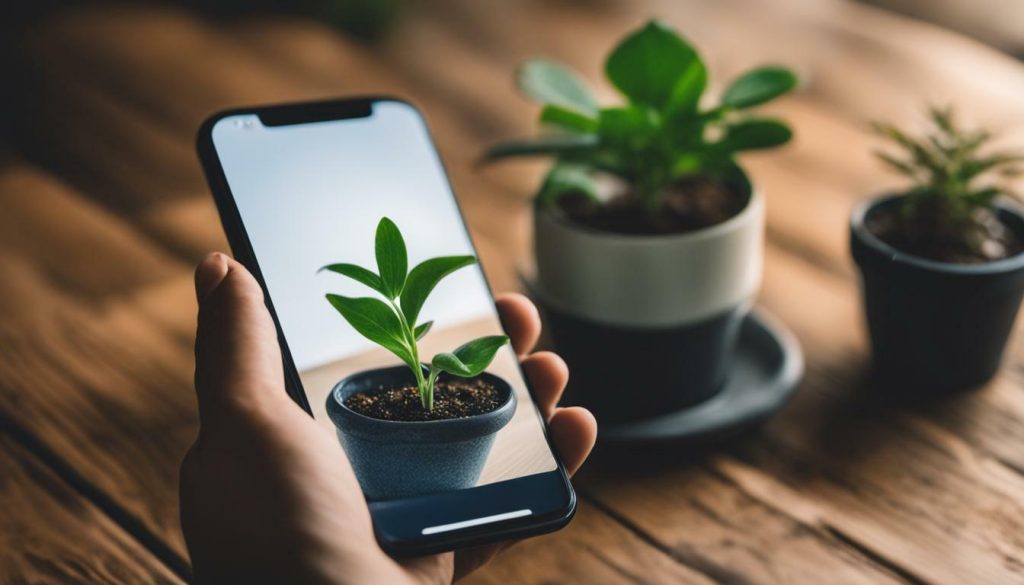Are you ready to break free from the never-ending cycle of scrolling and liking? Follow these simple steps to cut back on social media usage and prepare yourself to quit for good.
Cutting back or preparing to quit is the initial step in permanently quitting social media. By decreasing screen time and seeking support from loved ones, you can set yourself up for success in the long run.
Key Takeaways:
- Uninstall social media apps for gradually increasing periods of time.
- Set time limits and decrease screen time gradually.
- Put social media apps in folders to reduce temptation.
- Turn off push notifications and check emails instead.
- Talk to family and friends about your addiction for support.
Cutting Back or Preparing to Quit
Cutting back on social media usage is the first step toward quitting the addiction and regaining control of your time and attention. Here are some practical tips to gradually reduce your social media usage and prepare yourself for quitting:
- Uninstall social media apps for gradually increasing periods of time
- Set time limits and decrease screen time gradually
- Put social media apps in folders to reduce temptation
- Turn off push notifications and check emails instead
- Talk to family and friends about your addiction for support
By taking these steps, you can slowly wean yourself off of social media and build up your resistance to the urge to check your apps constantly. Once you feel more in control, you can move on to the next stage of quitting social media.
Cutting Back or Preparing to Quit with a Buddy
Cutting back on social media usage or quitting altogether can be challenging, so it can be helpful to have a friend or family member to do it with you. By quitting together, you can provide each other with accountability and support. You can also share your experiences and offer encouragement through the tough times.
If possible, try to find someone in your life who is also interested in quitting social media, or who is already living a social media-free life.
Cutting Back or Preparing to Quit with Alternative Activities
When we spend less time on social media, we may find ourselves with more free time on our hands. To make this transition easier, it can be helpful to find alternative activities to fill the void.
Consider taking up a new hobby, such as painting, knitting, or playing an instrument. You could also start a new exercise routine, go for walks outdoors, or read more books. Whatever you choose, make sure it’s something that you enjoy and that you can easily fit into your daily routine.

Quitting Social Media for Good
It’s time to take the plunge and quit social media for good. Follow these steps to ensure a successful and long-lasting transition.
- Make a final post to provide closure and accountability. Before deactivating your social media accounts, make a final post to let friends and followers know that you’ll be leaving the platform. This not only provides closure but also holds you accountable for your decision.
- Download and save important information before deactivating accounts. Before deactivating your accounts, make sure you’ve saved any important data, such as contacts or photos. This will prevent any regrets later on down the line.
- Give yourself treats and rewards for quitting and hitting milestones. Quitting social media can be challenging, so make sure to reward yourself for hitting milestones. This will help reinforce positive behavior and keep you motivated.
- Quit with a buddy for extra support. Find a friend or family member who also wants to quit social media and do it together. Having someone to lean on and hold you accountable can be incredibly helpful.
- Be prepared for withdrawal symptoms and have coping strategies in place. You may experience withdrawal symptoms such as anxiety or restlessness when quitting social media. Have coping strategies in place, such as deep breathing exercises or meditation, to help manage these feelings.
- Use physical reminders to resist the urge to check social media. Put rubber bands around your phone as a physical reminder not to check social media. This can help break the habit and reduce temptation.
- Establish a bedtime for your phone to avoid late-night social media use. Avoid using your phone before bed to improve sleep quality and reduce the chance of getting sucked into social media late at night.
- Get an alarm clock to reduce the habit of checking your phone upon waking. Using your phone as an alarm can make it tempting to check social media first thing in the morning. Switch to an alarm clock to break this habit.
- Find alternative news sources to stay informed without social media. Seek out news sources that don’t rely on social media to stay informed about current events.
By following these steps and strategies, you can successfully quit social media and experience the benefits of a more focused and fulfilling life.

Making a Final Post and Downloading Important Information
Before bidding farewell to social media, make a final post to inform your friends and followers about your decision and create a sense of closure. Use this opportunity to thank them for their support and let them know how they can stay in touch with you. This final post will provide accountability and closure, and prevent you from feeling the need to check in on your accounts later on.
Once you have made your final post, it’s time to download and save any important information from your accounts. This could include photos, contacts, messages, or any other data that you don’t want to lose. Each platform has its own process for downloading data, so check the platform’s help center or community forums to find out how.
It’s important to note that after you deactivate your accounts, you will not be able to access this information anymore. So, be sure to download and save everything you need before deactivating your accounts.
Aside from making a final post and downloading important information, you may want to give yourself treats or rewards for hitting milestones and quitting social media. Quitting with a buddy can also provide extra support and accountability, and it can be helpful to have coping strategies in place for any withdrawal symptoms that may arise.
You can use physical reminders, such as placing a rubber band on your phone, to resist the urge to check social media. Establishing a bedtime for your phone and getting an alarm clock can also help reduce the habit of late-night social media use and checking your phone upon waking.
Remember to find alternative news sources to stay informed without social media, such as reading newspapers or subscribing to newsletters. With these strategies in place, you will be well-prepared to maintain a social media-free lifestyle.

Finding Support and Coping Strategies
Quitting social media can be challenging, but having someone by your side who understands your struggle can make a significant difference in your journey. Consider quitting with a buddy or finding support through online communities or therapy. Coping with withdrawal symptoms is also an important part of the process.
Withdrawal symptoms can range from anxiety and irritability to restlessness and boredom. To cope with these symptoms, try practicing mindfulness exercises such as deep breathing or meditation. Exercise, getting outside, or taking up a new hobby can also distract your mind from social media.
Another strategy is to use physical reminders, such as placing rubber bands on your phone, to resist the urge to check social media. Establishing a bedtime for your phone and getting an alarm clock can also reduce the habit of checking your phone upon waking.
Remember to give yourself treats and rewards for quitting and hitting milestones. Celebrating small successes can motivate you to continue on your journey.
Lastly, find alternative news sources to stay informed without social media. Consider subscribing to newsletters or news apps that align with your interests.
By finding support and coping strategies that work best for you, quitting social media can become a positive and rewarding experience.
Establishing New Habits and Breaking the Urge to Check
Breaking the habit of constantly checking social media requires commitment and discipline, but with these strategies, you can overcome the urge and regain control. Here are some tips to help establish healthy habits and resist the temptation to check social media:
- Use physical reminders, such as placing rubber bands around your phone, to resist the urge to check social media.
- Establish a bedtime for your phone to avoid late-night social media use.
- Get an alarm clock to reduce the habit of checking your phone upon waking.
- Replace social media use with other activities, such as reading, writing, exercising, or spending time with loved ones.
- Take breaks from technology altogether by going for a walk, doing a puzzle, or practicing meditation.
- Keep yourself accountable by journaling or seeking support from others who are also quitting social media.
Remember that establishing new habits takes time and effort, so be patient and persistent in your commitment to a social media-free life.

Staying Informed without Social Media
Quitting social media doesn’t mean losing touch with the world – there are plenty of alternative sources to stay informed and engaged. Here are a few ways to keep up with the news:
- Subscribe to newsletters and RSS feeds of trusted news sources.
- Listen to podcasts or watch videos on YouTube to stay up-to-date on current events.
- Visit news websites directly instead of relying on social media to curate your news.
- Use a search engine to find news articles on specific topics.
It’s important to remember that social media is just one way to stay informed. By exploring alternative sources, you can broaden your perspective and gain a more well-rounded understanding of the world.

Embracing a Focused and Meaningful Life
Freeing yourself from the constant distractions of social media can open up a world of opportunities for meaningful conversations and deep connections. By quitting social media, you can regain control of your time and attention and focus on what truly matters in life. Here are some of the benefits you can expect:
- More meaningful conversations: Instead of scrolling mindlessly through your social media feed, you can engage in deeper conversations with the people around you. You can share your thoughts and ideas, listen to others, and build stronger relationships based on genuine connection.
- Increased productivity: With fewer distractions, you can concentrate on your work and accomplish more in less time. You can set clear goals, prioritize your tasks, and achieve your ambitions.
- Better mental health: Social media can be a source of stress, anxiety, and depression. By quitting, you can reduce the pressure to compare yourself to others, avoid negative comments and online drama, and improve your overall well-being.
Quitting social media can be a challenging transition, but by focusing on the positive aspects of your decision, you can embrace a more fulfilling and purposeful life. Here are some tips to help you along the way:
- Practice active listening: When you’re in conversation with someone, give them your full attention. Put away your phone, make eye contact, and listen actively to what they’re saying. Ask questions, share your own experiences, and show that you value their input.
- Engage in new activities: Without the constant lure of social media, you can explore new hobbies, interests, and experiences. Join a club, take a class, volunteer, or travel. These activities can help you meet new people, learn new skills, and broaden your horizons.
- Reflect on your values: Take time to reflect on your personal values and what matters most to you. Use your newfound clarity and focus to pursue your passions, form deeper connections, and make a positive impact on the world.

Remember, quitting social media is not just about giving up something, but also about gaining something. By letting go of the distractions and superficial connections of social media, you can create space for more meaningful experiences and relationships in your life. So take the leap, embrace a life free from social media, and enjoy the many benefits that come with it!
Long-Term Strategies for Success
Quitting social media is just the beginning; maintaining a social media-free lifestyle requires ongoing effort and the adoption of healthy strategies. Here are some tips for long-term success:
- Coping with FOMO: Fear of missing out can be a challenging emotion to deal with. Practice mindfulness and remind yourself of the benefits of a social media-free life.
- Practicing self-care: Use the extra time to pursue hobbies, reading, volunteering, or exercise. Seek therapy or mindfulness exercises to cope with any fear or anxiety.
- Embrace the present: Focus on enjoying experiences in the moment, rather than capturing them for social media. Take time to appreciate the world around you.
- Reminding yourself of the benefits: Remember the positive impacts of quitting social media, such as increased productivity, more meaningful conversations, and less time spent on comparison and envy.
By adopting these strategies and making a conscious effort to resist the urge to check social media, you can enjoy the benefits of a focused, fulfilling life.

Conclusion
By following these steps and strategies, you can successfully quit social media and experience the benefits of a more focused and fulfilling life. Cutting back on social media use and preparing yourself mentally is essential for a successful quit. Remember to make a final post before deactivating accounts and download any important information. Finding a support system and coping with withdrawal symptoms are critical parts of the process. Establishing new habits and breaking the urge to check your phone are key to maintaining a social media-free lifestyle. Finally, embrace alternative news sources and a more meaningful life. Practicing self-care and seeking therapy or mindfulness exercises can help with any fear or anxiety.
With the right mindset and tools, quitting social media can be an empowering and life-changing decision. Take advantage of newfound free time and pursue hobbies, reading, volunteering, or exercise. Remember the benefits of quitting, such as increased productivity and more meaningful conversations. You can do this!
FAQ
A: Some practical steps for reducing social media use include uninstalling social media apps for gradually increasing periods of time, setting time limits and decreasing screen time gradually, putting social media apps in folders to reduce temptation, turning off push notifications, and seeking support from family and friends.
A: To prepare yourself mentally to quit social media, it can be helpful to talk to family and friends about your addiction for support, make a final post to provide closure and accountability, download and save important information before deactivating accounts, give yourself treats and rewards for quitting and hitting milestones, and quit with a buddy for extra support.
A: To resist the urge to check social media, you can use physical reminders such as rubber bands on your phone, establish a bedtime for your phone to avoid late-night social media use, get an alarm clock to reduce the habit of checking your phone upon waking, and find alternative news sources to stay informed without social media.
A: The benefits of quitting social media include increased productivity, more meaningful conversations, the ability to focus on enjoying experiences in the moment, and the opportunity to pursue hobbies, reading, volunteering, or exercise with newfound free time.
Q: How can I cope with withdrawal symptoms?
A: To cope with withdrawal symptoms from quitting social media, it can be helpful to have coping strategies in place such as practicing self-care, seeking therapy or mindfulness exercises, reminding yourself of the benefits of quitting, and embracing the present moment.
A: To stay informed without social media, you can find alternative news sources such as news websites or podcasts, subscribe to newsletters or RSS feeds, watch news programs on television, or rely on trusted friends or family members to share important updates.
A: To maintain a social media-free lifestyle, it can be helpful to cope with FOMO (Fear of Missing Out) by reminding yourself of the benefits of quitting, practicing self-care, seeking support from others, and focusing on enjoying experiences in the present moment.
Share this content:






